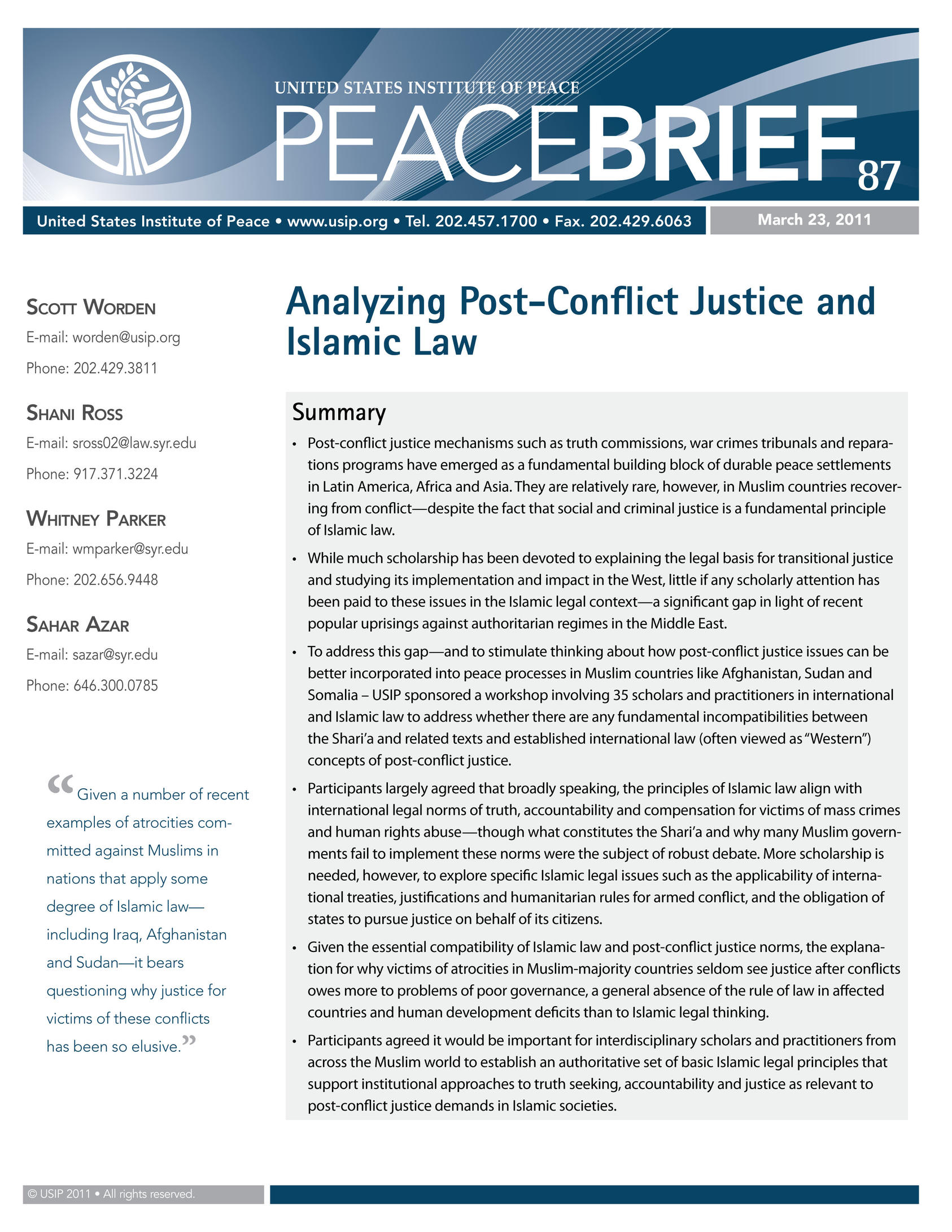Post-conflict justice mechanisms such as truth commissions, war crimes tribunals and reparations programs have emerged as a fundamental building block of durable peace settlements in Latin America, Africa and Asia. They are relatively rare, however, in Muslim countries recovering from conflict—despite the fact that social and criminal justice is a fundamental principle of Islamic law.

Summary
- Post-conflict justice mechanisms such as truth commissions, war crimes tribunals and reparations programs have emerged as a fundamental building block of durable peace settlements in Latin America, Africa and Asia. They are relatively rare, however, in Muslim countries recovering from conflict—despite the fact that social and criminal justice is a fundamental principle of Islamic law.
- While much scholarship has been devoted to explaining the legal basis for transitional justice and studying its implementation and impact in the West, little if any scholarly attention has been paid to these issues in the Islamic legal context—a significant gap in light of recent popular uprisings against authoritarian regimes in the Middle East.
- To address this gap—and to stimulate thinking about how post-conflict justice issues can be better incorporated into peace processes in Muslim countries like Afghanistan, Sudan and Somalia – USIP sponsored a workshop involving 35 scholars and practitioners in international and Islamic law to address whether there are any fundamental incompatibilities between the Shari’a and related texts and established international law (often viewed as “Western”) concepts of post-conflict justice.
- Participants largely agreed that broadly speaking, the principles of Islamic law align with international legal norms of truth, accountability and compensation for victims of mass crimes and human rights abuse—though what constitutes the Shari’a and why many Muslim governments fail to implement these norms were the subject of robust debate. More scholarship is needed, however, to explore specific Islamic legal issues such as the applicability of international treaties, justifications and humanitarian rules for armed conflict, and the obligation of states to pursue justice on behalf of its citizens.
- Given the essential compatibility of Islamic law and post-conflict justice norms, the explanation for why victims of atrocities in Muslim-majority countries seldom see justice after conflicts owes more to problems of poor governance, a general absence of the rule of law in affected countries and human development deficits than to Islamic legal thinking.
- Participants agreed it would be important for interdisciplinary scholars and practitioners from across the Muslim world to establish an authoritative set of basic Islamic legal principles that support institutional approaches to truth seeking, accountability and justice as relevant to post-conflict justice demands in Islamic societies.
About this Brief
This brief summarizes the first of its kind workshop on Post-Conflict Justice and Islam held in Washington, DC on November 5, 2010, which was jointly sponsored by the United States Institute of Peace (USIP), the International Institute of Higher Studies in Criminal Sciences (ISISC) and Syracuse University’s Institute for National Security and Counterterrorism (INSCT). This conference explored the legal basis for transitional justice in the Islamic context and how post-conflict justice issues can be better incorporated into peace processes in Muslim countries like Afghanistan, Sudan and Somalia. Scott Worden is a senior rule of law adviser for the U.S. Institute of Peace. Shani Ross and Whitney May Parker are research fellows at the Institute for National Security and Counterterrorism (INSCT) at Syracuse University. Sahar Azar is a juris doctor candidate at Syracuse University College of Law.